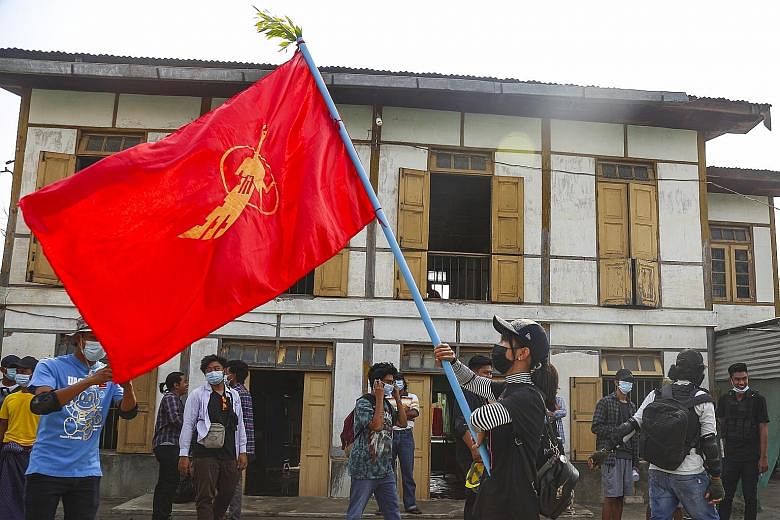NAYPYITAW • People in Myanmar opposed to the military junta marched, observed strikes and scrambled to overcome a shutdown of the Internet yesterday, undaunted by the generals' bloody suppression of protests during the past two months.
Hundreds of people have been killed while protesting since the Feb 1 coup, and opponents have used social media to publicise the security forces' excesses and to organise resistance to military rule.
Following the imposition of new curbs on the Internet, limiting Web access to fixed-line services only, anti-coup groups shared radio frequencies, offline Internet resources and providers of text message news alerts to keep communications going.
The military did not announce or explain its order to Internet providers to cut wireless broadband. Cellular data has been blocked for weeks by the authorities, which are struggling to stifle an opposition that is demanding the restoration of civilian rule and release of Ms Aung San Suu Kyi and other figures in her government.
Security forces opened fire at a rally yesterday in the central Sagaing region near Mandalay, where four people were shot and wounded, two critically, according to three local media organisations.
One witness told the Monywa Gazette that police were firing from a hill. Adding to the chaos in the former British colony, previously called Burma, hostilities between the armed forces and ethnic minority insurgents have broken out in at least two regions.
Across the country, demonstrators held "flower strikes", leaving bouquets, some with defiant slogans, at locations like bus stops, where activists killed by security forces had departed on their last journeys. People held roses in the air while making three-finger salutes, a symbol of resistance. Entire benches were covered in flowers and anti-coup messages. One arrangement of dandelions and red roses on a lakeside walkway read: "Myanmar is bleeding".
The extent of the Internet shutdown was not immediately clear, with pictures of marches, flower strikes and a funeral of a slain protester still being posted and shared on social media.
Protesters were seen in the streets in several urban centres throughout the day and on Thursday night, burning copies of the 2008 Constitution after remnants of Ms Suu Kyi's administration declared that they had repealed the military-drafted charter.
Another image shared widely showed an overhead view of hundreds of lit candles on a road in darkness, forming the words "we will never surrender".
The military's ruthless suppression of demonstrations against its Feb 1 power grab has left 543 civilians dead, including 44 children, according to the Assistance Association for Political Prisoners, a local monitoring organisation.
As well as breaking up protests with tear gas, rubber bullets and live rounds, security forces have detained some 2,700 people.
Violence has escalated in recent weeks, with Save the Children saying the death toll of youngsters had more than doubled in the past 12 days. Human Rights Watch said the junta had "forcibly disappeared" hundreds of people, refusing to confirm their location or allow access to lawyers.
A day earlier, members of the United Nations Security Council unanimously "expressed deep concern at the rapidly deteriorating situation", condemning violence against peaceful protesters.
Britain announced a new round of sanctions, this time targeting the junta's extensive business interests, as well as a US$700,000 (S$940,660) contribution towards UN efforts to document serious human rights violations in Myanmar.
Separately, Canberra yesterday called for Myanmar's military to immediately release an Australian economic adviser to Ms Suu Kyi, who has been in detention for two months. Economics professor Sean Turnell of Macquarie University in Sydney, who has been advising Ms Suu Kyi for years, was reportedly charged a week ago under Myanmar's official secrets law, together with Ms Suu Kyi and some of her ministers.
Myanmar's Asian neighbours, which it relies on for trade, have not imposed any embargoes, but some have adopted stronger language after security forces killed 141 people while the generals celebrated Armed Forces Day last Saturday. Neighbour Thailand, which has had cordial relations with Myanmar's military, on Thursday said it was "gravely troubled".
Tougher rhetoric has come from the Philippines, Malaysia, Indonesia and Singapore, whose foreign ministers have been meeting separately this week with their counterpart from China, which is among the few countries able to influence Myanmar's generals.
In an interview transcript made available late on Thursday, Singapore Foreign Minister Vivian Balakrishnan said he was "alarmed and appalled" at the violence, and that China also hoped for peace and dialogue.
REUTERS, AGENCE FRANCE-PRESSE

